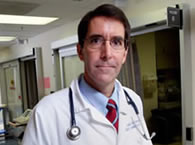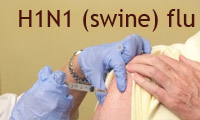News Release: Research, School of Medicine
Sep. 3, 2009
Institute of Medicine H1N1 Workshop Will Feature Algorithm for Assessing Flu Severity
Clinical Algorithms to Inform and Empower Health Care Professionals and the Public: Assessing the Severity of Influenza-Like Illnesses
 Dr. Arthur Kellermann
Dr. Arthur Kellermann"Overview of Clinical Algorithms"
Sept. 4, 2009, 8:00 a.m.
Keck Building, Room 100
500 Fifth Street, NW, Washington, DC
This event is open to media.
WASHINGTON, D.C. - When outbreaks of H1N1 influenza occurred last spring, mildly ill patients with flu-like illness flooded hospital emergency departments and community clinics. According to the President's Council on Science and Technology, up to 40 percent of the U.S. population may be infected with H1N1 in the coming year, and half of them could seek medical care.
At an Institute of Medicine workshop this week in Washington, D.C., Arthur Kellermann, MD, MPH, will describe a clinical algorithm that could help assess large numbers of flu victims during a major outbreak. Kellermann is professor of emergency medicine and associate dean for health policy in Emory University School of Medicine.
He and co-developer Alexander Isakov, MD, MPH, Emory associate professor of medicine and executive director of Emory's Office of Critical Event Preparedness and Response, and their team, believe the algorithm could be deployed in a variety of settings, by individuals as well as by healthcare workers.
In addition to Kellermann and Isakov, Emory faculty presenting at the meeting will be Harold Simon, MD, MBA, a pediatric emergency medicine expert and Ruth Parker, MD, a health literacy expert.
Ideally the new tool, if adopted and widely deployed, could reduce health system surge, relieve emergency department overcrowding, save time and prevent risk for symptomatic individuals, and free up healthcare workers to focus on the most severely ill.
###
The Robert W. Woodruff Health Sciences Center of Emory University is an academic health science and service center focused on missions of teaching, research, health care and public service. Its components include schools of medicine, nursing, and public health; Yerkes National Primate Research Center; the Emory Winship Cancer Institute; and Emory Healthcare, the largest, most comprehensive health system in Georgia. The Woodruff Health Sciences Center has a $2.3 billion budget, 17,000 employees, 2,300 full-time and 1,900 affiliated faculty, 4,300 students and trainees, and a $4.9 billion economic impact on metro Atlanta.
Learn more about Emory’s health sciences:
Blog: http://emoryhealthblog.com
Twitter: @emoryhealthsci
Web: http://emoryhealthsciences.org

